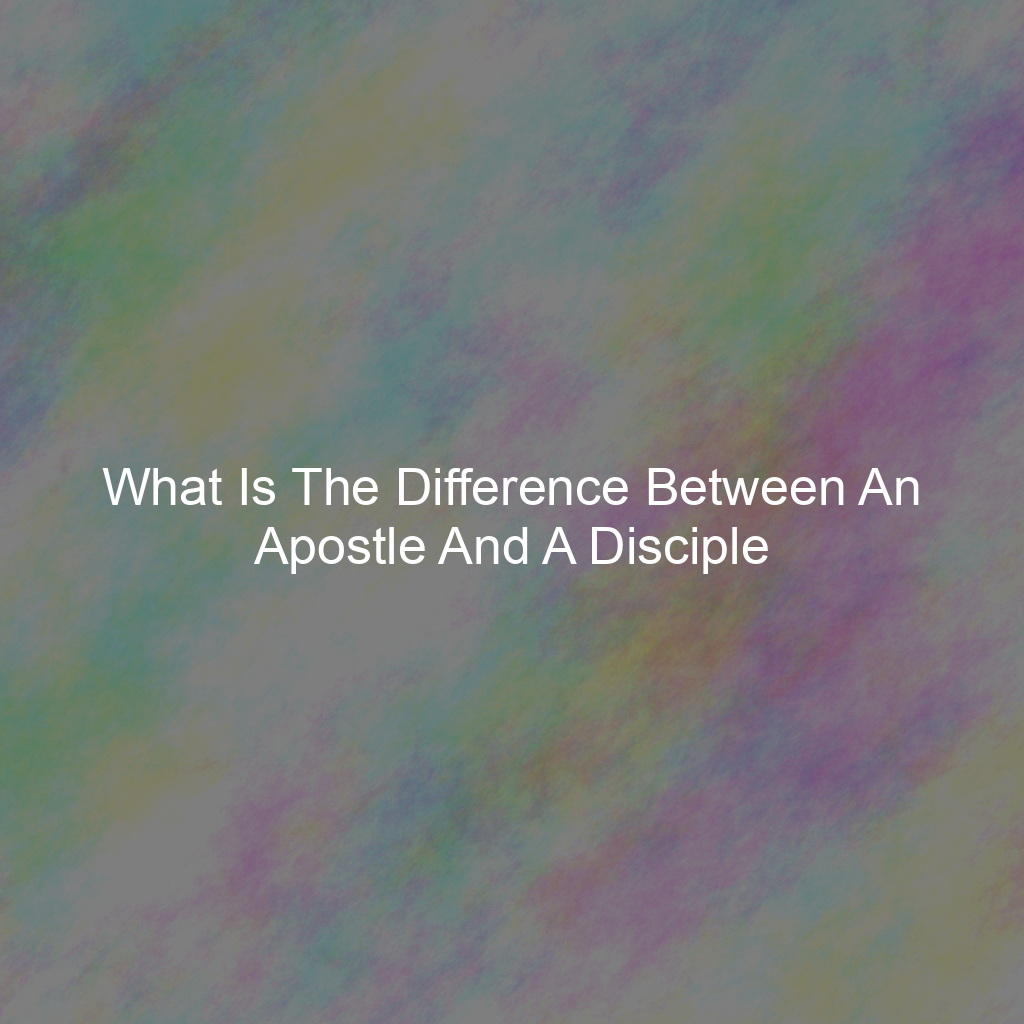What Is The Difference Between An Apostle And A Disciple
Introduction:
In the realm of Christianity, the terms “apostle” and “disciple” are often used interchangeably, but they actually hold distinct meanings and roles within the faith. Today, we will delve into the key differences between an apostle and a disciple, shedding light on their unique characteristics and responsibilities.
Definition of Apostle:
An apostle, derived from the Greek word “apóstolos” meaning “messenger” or “one who is sent out,” refers to a select group of individuals chosen by Jesus during his ministry on Earth. These individuals were handpicked to spread the teachings of Jesus and establish the Christian faith.
Definition of Disciple:
On the other hand, a disciple, from the Latin word “discipulus” meaning “learner” or “follower,” encompasses a broader group of individuals who followed Jesus during his time on Earth. While all apostles are disciples, not all disciples are apostles, as the term encompasses a wider group of followers of Jesus.
Distinguishing Characteristics:
Apostle:
Chosen directly by Jesus to spread his teachings.
Typically twelve in number, mirroring the twelve tribes of Israel.
Commissioned to perform miracles and lead and instruct others in the faith.
Saw the resurrected Jesus after his crucifixion.
Played a crucial role in the establishment and growth of the early Christian church.
Disciple:
Followers of Jesus who listened to his teachings and observed his ministry.
Included a broader group of individuals beyond the twelve apostles, such as Mary Magdalene and Martha.
While not commissioned to perform miracles or lead, disciples were instrumental in supporting and serving Jesus.
Learned from Jesus during his earthly ministry to carry on his teachings after his ascension.
Laid the foundation for the spread of Christianity through their witness and actions.
Interplay Between Apostles and Disciples:
Apostles were chosen from among Jesus’ disciples to continue his mission after his ascension.
Disciples supported and followed both Jesus and the apostles in their efforts to spread the Gospel message.
Together, apostles and disciples formed a cohesive unit working towards the common goal of sharing the message of salvation with the world.
As the apostles taught and performed miracles, the disciples provided essential support in various capacities, such as serving, sharing resources, and caring for the needs of the community.
Key Differences Summarized:
Apostles were specifically selected by Jesus for leadership roles, while disciples followed and served in various capacities.
Apostles focused on teaching, instructing, and performing miracles, while disciples supported, learned, and witnessed Jesus’ ministry.
All apostles were disciples, but not all disciples were apostles due to the distinct roles and responsibilities each group held.
Conclusion:
In conclusion, while the terms “apostle” and “disciple” are closely related in the context of Christianity, they carry distinct meanings and functions within the faith. Apostles were chosen by Jesus for leadership roles in spreading the Gospel, while disciples served, learned, and supported the ministry of Jesus and the apostles. Together, both groups played integral roles in the establishment and growth of the early Christian church.
FAQs:
1. Can someone be both an apostle and a disciple?
– Yes, all apostles were initially disciples of Jesus before being chosen for leadership roles.
2. How many apostles were there in total?
– In total, there were twelve apostles chosen by Jesus during his ministry on Earth.
3. Were there any female apostles?
– While there were no female apostles among the twelve, women like Mary Magdalene played significant roles as disciples.
4. What were some key responsibilities of the apostles?
– Apostles were tasked with teaching, performing miracles, and establishing the early Christian church.
5. Did all disciples continue to follow Jesus after his ascension?
– Yes, many disciples continued to spread the Gospel message after Jesus’ ascension, playing crucial roles in the early church.
6. How did apostles differ from other early church leaders?
– Apostles held unique authority and commission from Jesus himself, distinguishing them from other church leaders.
7. What were some challenges faced by the apostles and disciples?
– Apostles and disciples faced persecution, opposition, and logistical challenges in spreading the Gospel message.
8. How did the roles of apostles and disciples evolve over time?
– Apostles focused on foundational teachings and miracles, while disciples carried on the mission through teaching, service, and witness.
9. Were apostles and disciples considered equals in terms of authority?
– Apostles were given unique authority by Jesus, while disciples served in supportive roles within the early Christian community.
10. How did the legacy of apostles and disciples impact Christianity today?
– The legacy of apostles and disciples laid the foundation for the global spread of Christianity, shaping its beliefs, practices, and traditions.







